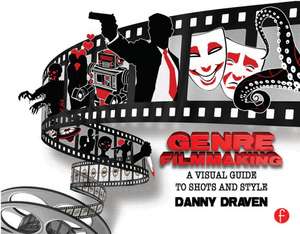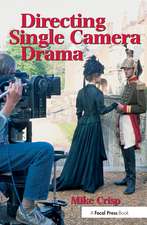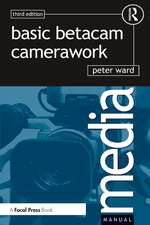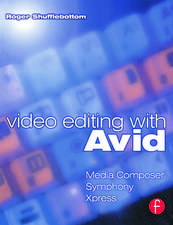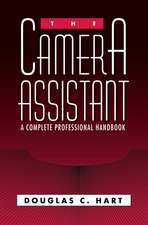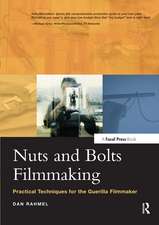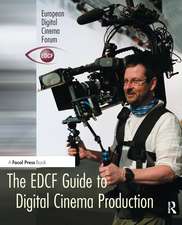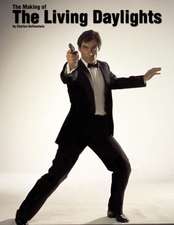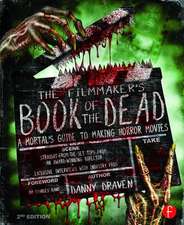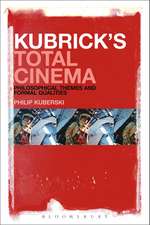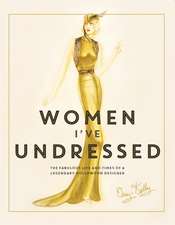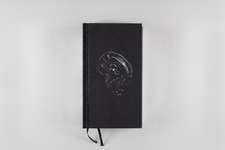Genre Filmmaking: A Visual Guide to Shots and Style for Genre Films
Autor Danny Dravenen Limba Engleză Paperback – 24 apr 2013
Whether you’re shooting a comedy, thriller, sci-fi or horror flick, you’ll need to know the answers to these questions. Learn how to execute the visual style of your genre in this highly illustrative, inspirational guide to shots and sequences for genre films. Jam-packed with full-color examples from the movies you love, Danny Draven shows you the aesthetic, emotional and visual techniques of popular shots and sequences used in genre films and then explains how, when, and why to use them.
- Inspiration meets practicality in this highly illustrative guide to working within a specific genre
- Learn how to play with the emotions and expectations of your audience by using camera techniques such as dolly zooms and ghost reveals.
- See a wide selection of major and independent film examples to inspire and inform you about visual techniques used in motion pictures.
| Toate formatele și edițiile | Preț | Express |
|---|---|---|
| Paperback (1) | 251.50 lei 6-8 săpt. | |
| Taylor & Francis – 24 apr 2013 | 251.50 lei 6-8 săpt. | |
| Hardback (1) | 1018.28 lei 6-8 săpt. | |
| Taylor & Francis – 11 sep 2017 | 1018.28 lei 6-8 săpt. |
Preț: 251.50 lei
Nou
Puncte Express: 377
Preț estimativ în valută:
48.12€ • 50.38$ • 39.82£
48.12€ • 50.38$ • 39.82£
Carte tipărită la comandă
Livrare economică 05-19 aprilie
Preluare comenzi: 021 569.72.76
Specificații
ISBN-13: 9780240824215
ISBN-10: 0240824210
Pagini: 264
Ilustrații: 600 colour illustrations
Dimensiuni: 277 x 216 x 23 mm
Greutate: 0.96 kg
Ediția:1
Editura: Taylor & Francis
Colecția Routledge
Locul publicării:Oxford, United Kingdom
ISBN-10: 0240824210
Pagini: 264
Ilustrații: 600 colour illustrations
Dimensiuni: 277 x 216 x 23 mm
Greutate: 0.96 kg
Ediția:1
Editura: Taylor & Francis
Colecția Routledge
Locul publicării:Oxford, United Kingdom
Public țintă
Professional Practice & DevelopmentRecenzii
"Genre Filmmaking offers a straight forward, useful guide to shots and style... Every section is filled with numerous examples of shots to be found within a film, from ‘the voyeur’ in horror and ‘bullet time’ in sci-fi, to the ‘lustful gaze’ in comedy and ‘the floating corpse’ in thriller. Draven places a heavy emphasis on images to demonstrate his points, showing how angles and positions of the shot can be taken in order to achieve a desired emotion of effect... Draven’s book is successful in offering a visual guide to shots and style, providing multiple ideas of shots as well as how and when they should be used. He provides plenty of examples within these four genres. It is easy to use and refer to due to the layout and clear use of imagery."- Raindance.org
Cuprins
The Horror Genre; Chapter 01 The Scary Dolly Zoom; Chapter 02 The Ghost Reveal; Chapter 03 The Weapon POV; Chapter 04 The Victim’s Eye; Chapter 05 The Body Split; Chapter 06 Silhouette Reveal; Chapter 07 The Gross out; Chapter 08 The Jump Scare; Chapter 09 Reflection Scares; Chapter 10 Terror from Behind (Split Focus); Chapter 11 The Monster Trap; Chapter 12 The Weapon Shadow; Chapter 13 Jaws of Death; Chapter 14 The Body Hole; Chapter 15 Danger at the Door; Chapter 16 Lurking from Above; Chapter 17 The Voyeur; Chapter 18 The Monster Inside; Chapter 19 Deadly Weapon Tracking Shot; The Comedy Genre; Chapter 20 The Seduction Shot; Chapter 21 The Lustful Gaze; Chapter 22 The Floating Camera; Chapter 23 Slow and Sexy Body Reveal; Chapter 24 The Surreal 360 Kiss; Chapter 25 Split Screen; Chapter 26 The Imagined Self; Chapter 27 The Marriage Transition; Chapter 28 Dual Scenes Sequence; Chapter 29 The Changing Seasons Sequence; Chapter 30 Multiple Dates 360; The Sci-Fi Genre; Chapter 31 The Surprise Attack; Chapter 32 Face Off; Chapter 33 Man vs. Alien; Chapter 34 Man vs. Nature; Chapter 35 Bullet Time; Chapter 36 The Abduction Shot; Chapter 37 The Creature Inside; Chapter 38 The Eye Reflection; The Thriller Genre; Chapter 39 The Eavesdropper Shot; Chapter 40 The Unexpected Jump; Chapter 41 The Car Pursuit; Chapter 42 Back from the Dead; Chapter 43 Under Surveillance; Chapter 44 The Urgent Call; Chapter 45 Panic 360 Shot; Chapter 46 Almost Captured; Chapter 47 Hiding from Danger (Split Focus); Chapter 48 Danger in a Reflection; Chapter 49 Cigarette Time Passage Transition; Chapter 50 The Floating Corpse;
Notă biografică
Danny Draven is an award-winning independent producer/director/writer who has directed over six horror features. From slasher movies to supernatural thrillers, his films have gained a cult following worldwide. His movies include Horrorvision, Hell Asylum, Cryptz, Stuart Gordon Presents: Deathbed, Darkwalker, and Ghost Month. His first film, Horrorvision, appeared on the Sci-Fi channel's William Shatner's Full Moon Fright Night. Draven also won the Best Director award at the Chicago Horror Film Festival for his film Ghost Month. Draven is currently a member of the the Producers Guild of America, Horror Writers Association, and Motion Picture Editors Guild.
Descriere
What does it look like? How is it done? When should I use it?
Whether you’re shooting a comedy, thriller, sci-fi or horror flick, you’ll need to know the answers to these questions. Learn how to execute the visual style of your genre in this highly illustrative, inspirational guide to shots and sequences for genre films. Jam-packed with full-color examples from the movies you love, Danny Draven shows you the aesthetic, emotional and visual techniques of popular shots and sequences used in genre films and then explains how, when, and why to use them.
Whether you’re shooting a comedy, thriller, sci-fi or horror flick, you’ll need to know the answers to these questions. Learn how to execute the visual style of your genre in this highly illustrative, inspirational guide to shots and sequences for genre films. Jam-packed with full-color examples from the movies you love, Danny Draven shows you the aesthetic, emotional and visual techniques of popular shots and sequences used in genre films and then explains how, when, and why to use them.
- Inspiration meets practicality in this highly illustrative guide to working within a specific genre
- Learn how to play with the emotions and expectations of your audience by using camera techniques such as dolly zooms and ghost reveals.
- See a wide selection of major and independent film examples to inspire and inform you about visual techniques used in motion pictures.
